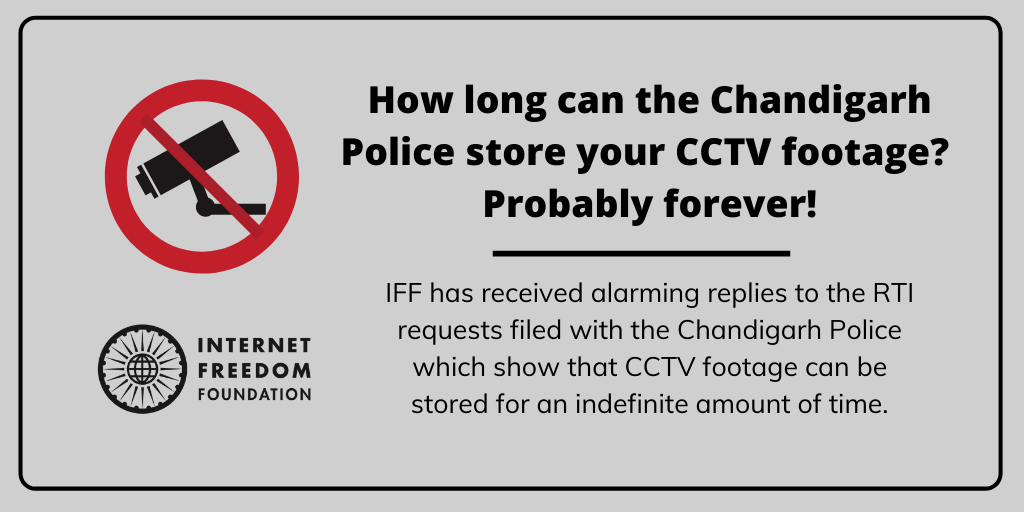
Tl;dr
IFF filed an RTI with the Chandigarh Police regarding their use of CCTVs in the city of Chandigarh and received a total of 5 responses from different departments. These responses, when looked at in their entirety, raise several concerns. In this blogpost, we have summarized these responses and also listed the immediate concerns which should be addressed by the Chandigarh Police.
Background
On 20 January 2020, IFF filed an RTI with the Chandigarh Police seeking information about the use of CCTV cameras and Facial Recognition Technology (FRT) systems in the city of Chandigarh. The questions asked revolved around the legal basis for installation of CCTV cameras, details of tenders issued for procurement of CCTV cameras, security and storage of CCTV footage and sharing of CCTV footage with external agencies.
We received a total of 5 replies from the Chandigarh Police after our RTI was transferred across several departments. Three responses are of particular relevance which are enumerated below.
Response from Chandigarh Police (Traffic Department) | February 5, 2020
In the first substantial reply we received on 5 February 2020, the Chandigarh Police (Traffic Department) disclosed that they have installed a total of 100 CCTV cameras at 20 intersections/roundabouts across Chandigarh. These cameras are operated by the CCTV Control Room of the Chandigarh Traffic Police. They have also shared a list of the locations where these cameras had been installed.
Chandigarh Police (Technical Department) | February 18, 2020
In the second and third replies we received on 18 February, 2020 from the Chandigarh Police (Technical Department), the following information was disclosed:
- The maintenance of CCTV cameras is entrusted to the Technical Department of the Chandigarh Police itself.
- There are a total of 227 analog cameras which have been installed. This does not match the figure of 100 cameras provided by the Traffic Department.
- The cameras being used are of various brands including Bosch, Hikvision, Samsung and Adhua.
- When asked about the storage duration and capacity, the Chandigarh Police stated that how long CCTV footage is stored depends on the storage capacity of existing DVRs/Hard Disks provided with these systems.
- With regard to access to the data, the Chandigarh Police has disclosed that Senior Officers of the Chandigarh Police are authorized to obtain the CCTV footage of these systems “as and when required in various police investigations/enquiries/RTI matters etc.”
Lingering Concerns
The RTI responses received raise four major concerns. First, due to the discrepancy in numbers, we currently do not know how many cameras have been installed in the city of Chandigarh. It is unclear whether 100 cameras mentioned by the Traffic Department are in addition to or included within the 227 cameras mentioned by the Technical Department of Chandigarh Police. Second, there is blatant violation of the principle of storage minimization because the footage from CCTV cameras is retained for an indefinite period of time and it is not deleted after a stipulated period. This type of indefinite storage of outdated footage increases the risk of data breaches and misuse. Third, all Senior Officers of the Chandigarh Police are authorized to access the footage as and when required but there is no clear definition to determine which police officers qualify as “Senior Officials.” Finally, sharing footage with police officials for any police investigations/enquiries/RTI matters etc. is overbroad and it has left us wondering whether footage can be accessed by any individual who files a request for information under the RTI Act.
The operation of CCTV cameras must be governed by a proper legislative framework and stringent operating procedures to prevent disproportionate encroachment on citizens’ privacy. The Chandigarh Police must reconsider their approach to video surveillance and take necessary measures to ensure that CCTV cameras function in a fair, transparent and accountable manner.
(This blogpost has been authored by Anushka Jain, a legal fellow at IFF, and reviewed by IFF staffers, Devdutta and Sidharth)
Important Documents
- RTI filed by IFF dated 20 January, 2020. (link)
- RTI response dated 5 February, 2020. (link)
- RTI response dated 18 February, 2020. (link)
RTIs take time, effort and perseverance but they are one of the few available tools to demand transparency and accountability from those in power. Help us unearth more information about how mass video surveillance is being implemented in India by becoming an IFF member today!
